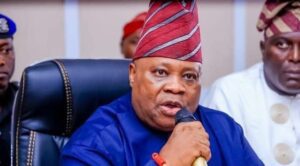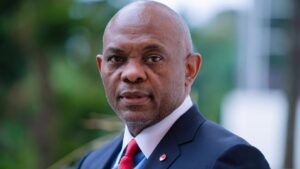Nigeria needs to obtain loans to make meaningful progress, development — Fashola
By Ayo Fadimu
The Minister of Works and Housing, Babatunde Fashola, has said the country needs to obtain loans to finance its infrastructural development if its desires to experience growth and development.
Fashola, while speaking in Abuja on Sunday, to mark the sixth year anniversary of the present administration insisted that the country would not make meaningful progress without taking loans to boost infrastructure.
He explained that borrowing is not a sin and it is part of the essence of keeping the economy growing.
“It is in our own interest that the government does some borrowing and spends it on investment because that sector contributes to the Gross Domestic Products (GDP) and contributes to employment.
“I do not support irresponsible borrowing so let us be clear; there has to be some sense to this.
“So long as you are borrowing to invest and you are investing in assets then we can have this debate from morning till night and I don’t think I will come out unsuccessful.
“I agree everybody must keep their eyes open about how money is being borrowed, what it is being used for and whether the debt is sustainable.
“We just delivered a rail programme through the Ministry of Transportation; that is a 100-year asset that you have got now.
“So some economists say wait until you gather the money, that’s bad economics,” the minister said.
While pointing out that many developed countries created super economies through borrowing, Fashola said that the recent loans obtained by the Federal Government would not mortgage the future of Nigerians.
“We came from a background of colonialism where we were told that if you go borrowing you go sorrowing, so, my parents and their generation told us never to borrow.
“But while we were not borrowing, those who laid the rules started borrowing.
“The largest debtors in the world today are from the West. But with borrowing they have created super economies, built massive train terminals, massive airports, schools and hospitals.
“And you know what is happening, we go to use them and they charge us, so who is paying?
“I have heard people say they are mortgaging the future of people, as we are holding this meeting, one new baby has arrived, if you don’t prepare for him you make that future bleak.
“As at the time we were building Lekki Bridge in Lagos, it was N29 billion, the child that was born then in 2010 is going to be 11 this year.
“If his mother carrying his pregnancy had crossed that bridge at any time, he used that bridge before he was born and we had secured that asset for him before he arrived.
“If we wait until he is about 30 to build that bridge, we can’t buy it at N29 billion anymore.
“So, if he contributes to paying it so be it because he started using it before he even arrived.
“So, those who said don’t borrow have changed their minds, they have set parameters of debt to GDP and within those parameters you play very well.
“And those who say so now, where were they in 2005 or 2006 when the government paid out 12 billion dollars in cash to go and buy a tent when the house is flooding, who does that?
“They took 12 billion dollars in cash to go and write off debts that have been classified.
“The roads were bad then, the rail was not built, airports needed expansion, Lagos-Ibadan (express way) needed to be built.
“But since the aftermath of going to write off that debt we started borrowing again, so this administration did inherit all the debt.
“There is a sector of our economy called the financial services sector, if all of us put money in a bank and nobody is borrowing, that bank is going to fold up.
“So, if you have anybody in any venture capital, finance house, mortgage bank, it is because the government is borrowing that they can pay their salary.
“Borrowing is not a sin, it is part of the essence of keeping the economy growing and the armchair economists talking about public expenditure for example who have never run a government must be careful what they feed to the public,’’ Fashola added.
On the Lagos-Ibadan Expressway and other key road projects, including the 2nd Niger Bridge, the Minister assured that they will be delivered before the end of President Muhammadu Buhari administration in 2023.
“We have about 44 roads under Sukuk. There are many of them across the A1-A9 so we talk about the second Niger bridge, the Lagos-Ibadan expressway, the Abuja-Kano road, those are some of the roads we intend to finish.
“We’ve finished some sections of the Tambuwal-Jega Road, Kano-Maiduguri about 350km have been completed. We’ve finished section of Enugu-Portharcourt Road.
“Some sections of the Benin to Lokoja highway have also been completed. All those sections that you drive on are the sections that have been completed because we build in sections so probably 10 km you divert to the other way.”
Fashola further listed some roads that have been completed because of the issuance of certificate of completion.
“Enugu-Portharcourt road, we have completed about 124km, Kano-Maiduguri we have completed 398km, Lagos-Ibadan expressway, we have completed 79km out of 127km.
“On Sokoto-Tambuwal-Jega-Yauri-Kotangora 424km, on Gombe-Nina-Yola-Taraba 78 km, on second Niger bridge, we have done 2000m out of 3200m and we will finish that by next year.
“The Bodo-Bonny bridge we have done 778m of bridge work out of 3000m and we’ve done 4.6km of road work out of 34km.”
On the Trans-Sahara routes, the minister said work was also in progress, Lagos to Mumbasa which is part of Lagos-Enugu through Cameroon all the way to Chad from the eastern flank all the way to East Africa.
“There is the Lagos to Algeria through Niger Republic, Lagos-Ibadan expressway is part of that route all the way to Sokoto and from there to Niger Republic.
“Then to Algeria, some are still outstanding and some sections of Benin to Lokoja highway have been completed. Lagos to Badagry highway 400km, Oyo to Ogbomosho 78km.
“It is just a lot because our roads are long, so all those sections that you drive up, are the sections that are completed.
“There is the Cameroon- Nigeri to Kufo bridge which will be finished August this year, it is almost done.” Fashola said.
The Minister also reaffirmed that construction of the Second Niger Bridge would be completed next year.
According to Fashola, the bridge, which will serve as a major link between South East and South West Nigeria will be delivered between the second and third quarters of 2022.
Records show that construction of the bridge commenced on Sept. 1, 2018 with construction cost put at N336 billion when the contract deal was signed.
The minister, however, made no mention if the construction cost of the facility had changed since the commencement of work.
He said that the project would facilitate influx of investments to the South East when completed.
Fashola said that the construction work had gone beyond the water level, explaining that most bridge works were done under water.
“So, what you see currently is the final work. The sub-structure which entailed building cement structures under water often costs a lot of money.
“We should finish the bridge next year between the second quarter and third quarter,’’ he affirmed, saying that construction time was lost because of COVID-19.
The bridge is 1.6km long and furnished with other ancillary infrastructure, including a 10.3km highway and an inter-change, expected to be completed next year.
The bridge spans from Asaba in Delta State to Ozubulu, Ogbaru and other communities in Anambra State.
The existing Niger Bridge, linking Onitsha and Asaba was completed in December, 1965.
It was built by the French construction giant, Dumez.




